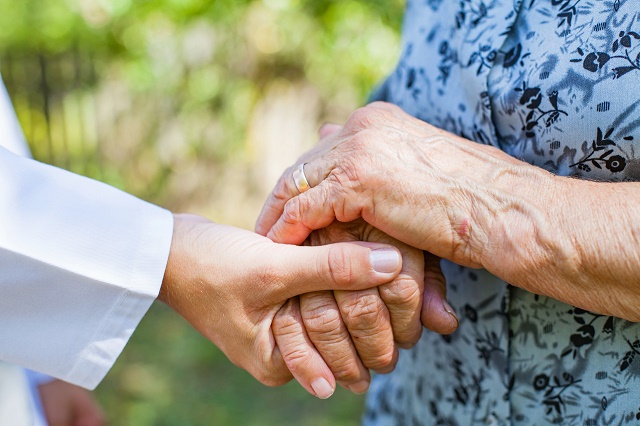Program creates easy access to services, boosting older people's self-worth
With her cane leaning to one side, 69-year-old Hong Mei holds onto the handrails of the treadmill and walks slowly as she chats with her friends.
After undergoing surgery to repair a hip fracture, Hong has been visiting the newly opened community gym for about a month, arriving at 10 am most days. The gym is free for seniors in the community who can take part in exercise programs and follow rehabilitation instructions suggested for them after undergoing physical assessments.
However, as a senior resident of 380 Lane Community in Jing'an district in Shanghai, Hong is eligible for many other benefits under an integrated community pilot program.
"The recovery is going well, and my days with my senior friends are fulfilling," she said.
"It's healthy, cheap and convenient to have breakfast and lunch at the community canteen and a casual dinner at home," Hong said, adding that she participated in community singing and dancing activities two or three times a week before her surgery.
The community is one of 106 communities participating in the pilot program, which focuses on accommodating a set community population and providing easy access to basic public services.
The concept was proposed in 2010 by Wu Liangyong, a professor at Tsinghua University and an academician of the Chinese Academy of Sciences and Chinese Academy of Engineering, who took it as the basic living unit. Inspired by the "walkable neighborhoods" of Singapore, the Ministry of Housing and Urban-Rural Development stipulated that an integrated community should accommodate a population of 5,000 to 12,000 people and guarantee residents convenient access to public amenities within a five-to-10-minute walk.
The close-knit nature of such communities is seen as ideal for elderly people who need easy access to activities, meals and health services. Living in such communities also gives elderly residents a greater sense of self-worth and the ability to interact with others.
China initiated the integrated community pilot program in October 2022, and in July last year designated a batch of pilot communities to better meet the needs of the elderly.
Second lease on life
Old residential areas constitute a significant proportion of housing in China as well as the pilot communities.
The 380 Lane Community is one such community with 5,270 residents across 46 buildings. Comprised of four residential areas established around 1995, elderly people account for nearly 50 percent of the residents. Some are retired professionals who still have a great deal to offer the community.
"I no longer perceive myself as a burden to my children, but I find I have a deeper sense of happiness," said 69-year-old Cheng Cuiping, a retired doctor who volunteers at the health service desk in the community's public services center.
"Now, I'm able to take care of myself on my own, and I have things to do every day."
Cheng helps measure the height, weight and blood pressure of elderly people who come for free checkups. During the lunch break between 11 am and 1:30 pm, she spends around 15 yuan ($2.10) on a low-salt, low-oil and nutritionally balanced lunch at the canteen.
She also goes to a nearby digital booth to scan a QR code to get a free mask. The digital booth has a remote tele-consultation machine for minor illnesses, and a 24-hour pharmacy dispensing both over-the-counter and prescription medication.
A 5-square-meter orange booth has been set up in the community for commercial businesses to provide services such as housekeeping, laundry and kitchen knife sharpening. However, as a condition of their operations, the businesses must employ at least one member from the community.
"We constantly adapt our services based on the needs of the residents. For instance, we helped one senior repair his old mechanical watch, and we offer on-site service to elderly people who need to wash their curtains," said Gu Haibin, a local Party official.
"Staff at the spot are all residents of the community, relieving the unemployment problem while providing more intimate services."

